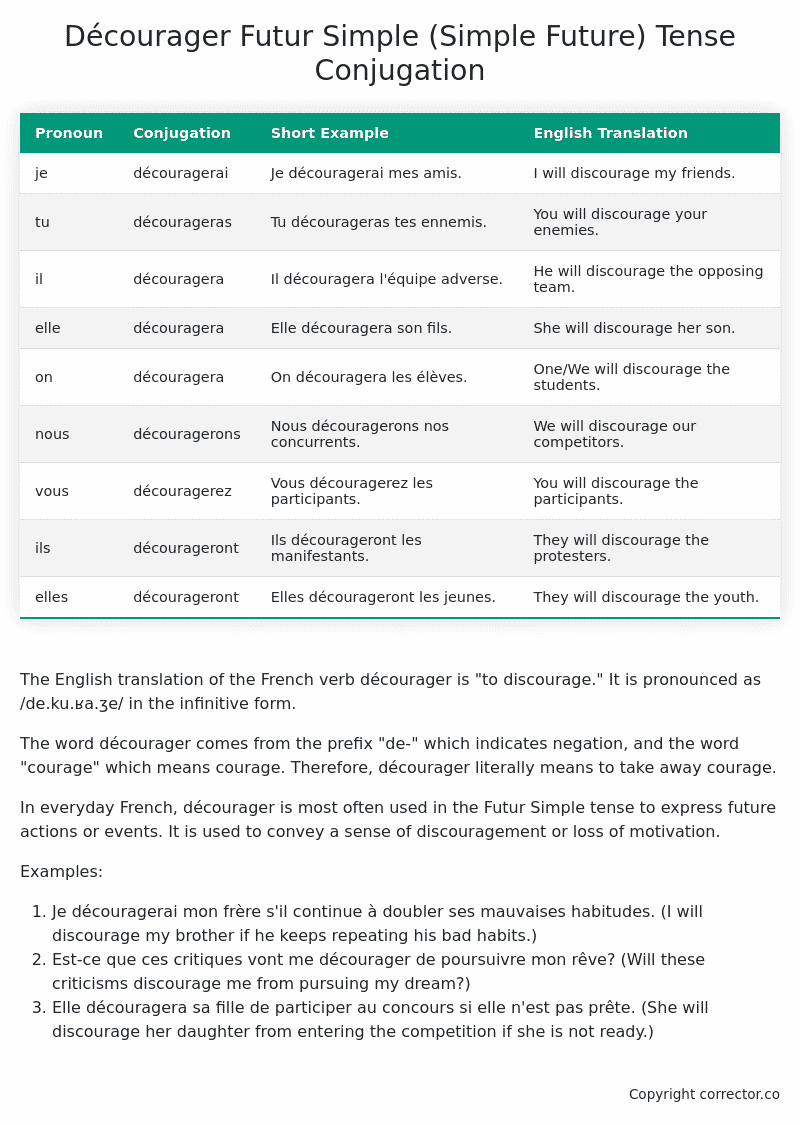Futur Simple (Simple Future) Tense Conjugation of the French Verb décourager
Introduction to the verb décourager
The English translation of the French verb décourager is “to discourage.” It is pronounced as /de.ku.ʁa.ʒe/ in the infinitive form.
The word décourager comes from the prefix “de-” which indicates negation, and the word “courage” which means courage. Therefore, décourager literally means to take away courage.
In everyday French, décourager is most often used in the Futur Simple tense to express future actions or events. It is used to convey a sense of discouragement or loss of motivation.
Examples:
- Je découragerai mon frère s’il continue à doubler ses mauvaises habitudes. (I will discourage my brother if he keeps repeating his bad habits.)
- Est-ce que ces critiques vont me décourager de poursuivre mon rêve? (Will these criticisms discourage me from pursuing my dream?)
- Elle découragera sa fille de participer au concours si elle n’est pas prête. (She will discourage her daughter from entering the competition if she is not ready.)
Table of the Futur Simple (Simple Future) Tense Conjugation of décourager
| Pronoun | Conjugation | Short Example | English Translation |
|---|---|---|---|
| je | découragerai | Je découragerai mes amis. | I will discourage my friends. |
| tu | décourageras | Tu décourageras tes ennemis. | You will discourage your enemies. |
| il | découragera | Il découragera l’équipe adverse. | He will discourage the opposing team. |
| elle | découragera | Elle découragera son fils. | She will discourage her son. |
| on | découragera | On découragera les élèves. | One/We will discourage the students. |
| nous | découragerons | Nous découragerons nos concurrents. | We will discourage our competitors. |
| vous | découragerez | Vous découragerez les participants. | You will discourage the participants. |
| ils | décourageront | Ils décourageront les manifestants. | They will discourage the protesters. |
| elles | décourageront | Elles décourageront les jeunes. | They will discourage the youth. |
Other Conjugations for Décourager.
Le Present (Present Tense) Conjugation of the French Verb décourager
Imparfait (Imperfect) Tense Conjugation of the French Verb décourager
Passé Simple (Simple Past) Tense Conjugation of the French Verb décourager
Passé Composé (Present Perfect) Tense Conjugation of the French Verb décourager
Futur Simple (Simple Future) Tense Conjugation of the French Verb décourager (this article)
Futur Proche (Near Future) Tense Conjugation of the French Verb décourager
Plus-que-parfait (Pluperfect) Tense Conjugation of the French Verb décourager
Passé Antérieur (Past Anterior) Tense Conjugation of the French Verb décourager
Futur Antérieur (Future Anterior) Tense Conjugation of the French Verb décourager
Subjonctif Présent (Subjunctive Present) Tense Conjugation of the French Verb décourager
Subjonctif Passé (Subjunctive Past) Tense Conjugation of the French Verb décourager
Subjonctif Imparfait (Subjunctive Imperfect) Tense Conjugation of the French Verb décourager
Subjonctif Plus-que-parfait (Subjunctive Pluperfect) Tense Conjugation of the French Verb décourager
Conditionnel Présent (Conditional Present) Tense Conjugation of the French Verb décourager
Conditionnel Passé (Conditional Past) Tense Conjugation of the French Verb décourager
L’impératif Présent (Imperative Present) Tense Conjugation of the French Verb décourager
L’infinitif Présent (Infinitive Present) Tense Conjugation of the French Verb décourager
Struggling with French verbs or the language in general? Why not use our free French Grammar Checker – no registration required!
Get a FREE Download Study Sheet of this Conjugation 🔥
Simply right click the image below, click “save image” and get your free reference for the décourager Futur Simple tense conjugation!

Décourager – About the French Futur Simple (Simple Future) Tense
Formation of Futur Simple
For regular -er verbs (e.g., parler – to speak)
For regular -ir verbs (e.g., finir – to finish)
For regular -re verbs (e.g., vendre – to sell)
Common Everyday Usage Patterns
Conditional Statements
Interactions with Other Tenses
Futur Antérieur
Conditional
Present
Summary
I hope you enjoyed this article on the verb décourager. Still in a learning mood? Check out another TOTALLY random French verb conjugation!


